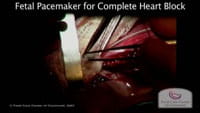What is Complete Heart Block?
Complete heart block is a disorder of the heart’s electrical system, which controls the rate and rhythm of heartbeats. Heart block occurs when there is a disruption, preventing the electrical signal from the upper chambers of the heart (the atria) from reaching the lower chambers (the ventricles).
Normally, the electrical signal passes through specialized conducting tissue known as the atrioventricular (AV) node. After the signal passes through the AV node and reaches the ventricles, it causes the heart to contract and pump blood. When this signal does not transmit properly, there is heart block or AV block. This does not mean that the flow of blood in the heart or that the blood vessels of the heart are blocked. It does mean that the electrical signal that spreads across the heart with each heartbeat is slowed or in some cases completely interrupted. This can limit the ability of the heart to pump blood to the rest of the body.
There are three types of heart block, depending on the extent of disruption of the electrical impulses: first degree, second degree, and third degree. Also known as complete heart block, third degree is the most severe and represents complete interruption of electrical communication between the atria and ventricles.
While all forms of heart block, including complete heart block, more commonly occur after birth, some babies are born with heart block. This is known as congenital and can be detected before or after a baby is born.




